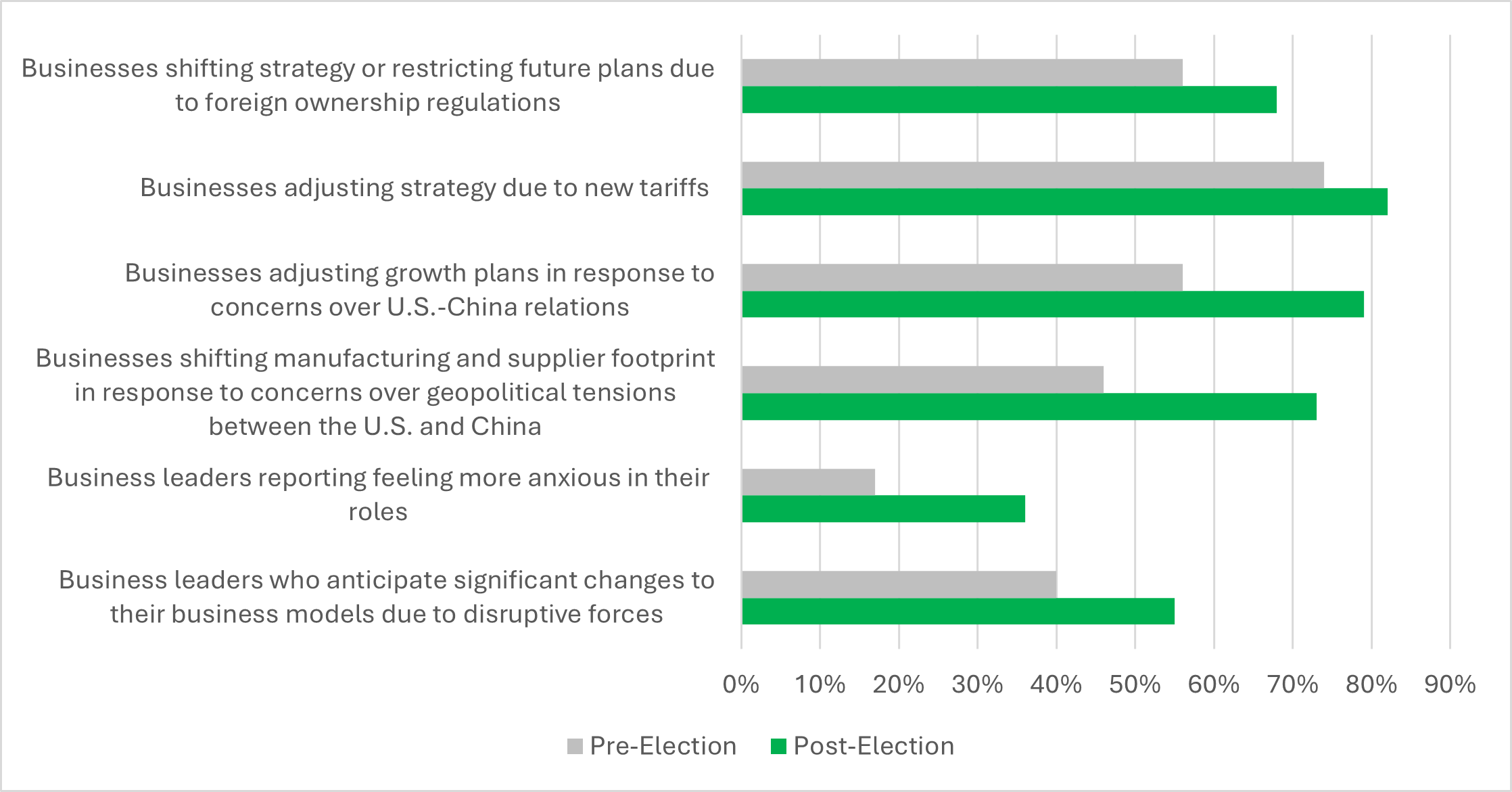
2025 AlixPartners Disruption Index: Get ready for the productivity push
NEW YORK (January 16, 2025) – Today, AlixPartners released its 6th annual AlixPartners Disruption Index, which surveyed 3,200 CEOs and senior executives around the globe to glean their insights on the challenges, priorities, and opportunities facing their businesses. This year’s survey reveals a paradoxical trend—while two thirds of CEOs said their businesses are highly disrupted, their level of anxiety has in fact remained stable, indicating that business leaders are getting their “sea legs.” Furthermore, the takeaway from the very best performers is that they are not only growing accustomed to disruption, they’re also actively embracing it and capitalizing on it to positive effect.
We looked at the companies that performed at the highest level of both growth and profitability. The top 7% of the sample, 229 companies, told us that they set the pace in their industry in revenue growth and saw profits increase 10% or more last year. Data from the survey reveals four practical, no-regrets moves that set the best-performing companies apart from the others:
There’s evidence in the 2025 Disruption Index that we are on the cusp of a productivity revolution, driven by technology, by skills and tight labor markets, and by all the work companies have done to transform operations. Productivity has become the #1 workforce issue. The growth and profitability leaders in our survey said they focus digital investments on business outcomes, citing productivity first, followed by sales and marketing and supply chain management—three areas where it is possible to attain and measure results that flow directly onto the income statement.
AI, automation, and robotics are among the biggest areas for growth and opportunity. As business leaders have embraced disruption, they now face the complex challenge of balancing technological investments to future-proof their organizations, while maintaining a close watch on the risks embedded in tech innovations. At the same time, these new technologies promise to drive faster productivity and economic growth, abundant and cheap energy, and longer lives, with a higher quality of life, through advances in healthcare.
Rising in the ranks of all business leaders’ biggest worries for 2025 are data privacy and cybersecurity, with 46% saying these pose a threat to their company over the next 12 months. Other leading challenges CEOs say they will face in 2025 are supply chain instability, workforce transformation, regulation and taxation, and increasing geopolitical tensions.
Simon Freakley, Executive Chairman of AlixPartners, said: “While disruptive forces continue to shape the CEO playbook, more and more business leaders are gaining confidence and citing diminishing anxiety about their ability to manage their impacts. The very best performers however are now moving beyond simply managing disruptive circumstances and are instead embracing and harnessing them. For example, they are leaning into AI and digital technology like never before, recognizing it as more than a tool to drive efficiency, but rather as an important productivity enabler that augments human intelligence to drive growth.
“Disruption in all its guises shows no sign of abating, therefore getting ahead of it and acting decisively has become an integral part of the successful CEO’s skill set. This deliberately front-footed approach underscores why settling for a strategy of mitigation is not an option. In a continually disrupted environment it’s no longer about simply weathering the storm. Instead, it’s about very deliberately harnessing its energy to drive opportunity and increase value.”
On the back of a year which saw elections in countries that are home to almost half of the world’s population, business leaders cite inflation, interest rates, geopolitical conflict, and regulation and taxation as top threats to their business. Over half (56%) of executives say their company is modifying growth plans due to concerns over U.S.-China relations, and 74% of companies say that new tariffs are causing them to adjust their strategy. To get ahead of disruption from U.S.-China tensions, 65% of CEOs are preparing for potential impacts to material costs and supplier reliability by adjusting manufacturing and supplier footprints and pricing strategies.
Following the U.S. Presidential election in November, AlixPartners conducted a survey of 500 executives of the same demographic profile [from November 12 to December 2, 2024]. Results revealed:

CEOs see automation of physical processes as a huge opportunity, with 72% of CEOs envisioning the deployment of humanoid robots at scale within the next five years. Executives are increasingly looking to AI and digital technology to grow their businesses, with 80% of executives reporting optimism about the impact of AI. The majority (61%) of executives are primarily focused on using AI to drive revenue growth, and 39% are primarily focused on using AI to drive cost reduction. Despite their optimism, business leaders remain cautious of AI’s effect on the workforce, as 35% of business leaders report concerns about an overreliance on AI, and its potential to reduce critical thinking and problem-solving skills among employees.
While DEI programs are under scrutiny in corporate America, 73% of business leaders in our survey believe initiatives tied to social issues (such as diversity and inclusion, human rights, etc.) have had a positive impact on their company’s economic performance, and 94% of executives whose companies lead their industries in both growth and profitability view diversity and inclusion as a competitive advantage. Three-quarters of survey respondents said environmental concerns are causing changes to business strategy. A similar number of business leaders believe the environmental actions they have taken have had a positive impact on their company’s financial performance.
As global workforces continue to transform, businesses are investing in technology and training programs to monitor and improve employee productivity, with leaders prioritizing upskilling and operational experience to enhance resilience, particularly as it relates to AI and technology, to create agile, disruption-ready workforces. Leaders are increasingly prioritizing agility and adaptability when evaluating their teams and show far more impatience with how disruption-ready their companies are—75% of executives believe they need more support from personal and professional advisors, with 43% expecting to hire more full-time workers, up nine percentage points from a year ago.
With threats from cyber-attacks and deep fakes increasing alongside the growth of AI adoption, data privacy and cybersecurity have surged to the forefront of business leaders’ concerns. Nearly half (46%) of executives cite data privacy and cybersecurity as a major threat—a 20-point jump from last year’s survey. This is particularly notable since 45% of business leaders expect significant digital transformation within the year, particularly in sectors where operational efficiency is critical. In addition, cybersecurity and AI are cited as the most important near-term digital investments.
In our survey, “growth and profitability leaders” are defined as those companies that are growing both their top and bottom lines faster than the rest of their industry (7% of respondents). Of this group of winners, a whopping 91% expect to make transformative or material acquisitions in the coming year, compared with 53% of all other respondents. And 65% expect to make significant business model changes in the next year, compared with 38% of the rest of the pack. Further, 87% of growth and profitability leaders are investing more money in digital tools and technologies in 2025 than they did in 2024, vs. 58% of other respondents. Finally, 73% of those leaders are reporting returns of 10% or more from their digital investments, compared with 14% of others.
AI is emerging as a critical tool to combat potential supply chain snarls, with 81% of business leaders believing AI and machine learning will improve their supply chain operations, particularly as material costs and availability fluctuate. Supply chain disruption remains a key area of focus, with 45% of respondents expecting supply chain disruption will be more of a challenge in the next 12 months—up 14 percentage points from last year. Almost three-quarters of business leaders surveyed believe their company will need to adjust its pricing strategy to respond to supply and demand volatility in the year ahead.
The 2025 AlixPartners Disruption Index Report is available at: https://www.alixpartners.com/disruption-index/.
*Data from AlixPartners post-election survey of 500 executives of the same demographic profile [from November 12 to December 2, 2024].
About AlixPartners
AlixPartners is a results-driven global consulting firm that specializes in helping businesses successfully capitalize on opportunities and address critical challenges. Our clients include companies, corporate boards, law firms, investment banks, private equity firms, and others. Founded in 1981, AlixPartners is headquartered in New York and has offices in more than 20 cities around the world. For more information, visit www.alixpartners.com.
Contact:
Ed Canaday
[email protected]
+1 917-434-5075